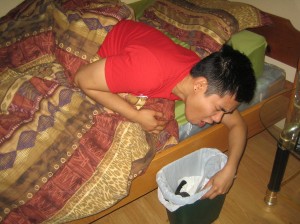If an individual just recently ate chicken and ends up suffering from symptoms of nausea, diarrhea, vomiting, fever, appetite loss and fatigue, food poisoning might be the culprit. It is important to note that food poisoning can be triggered by consuming expired chicken, incorrectly cooked chicken or bacteria from raw chicken that contaminated other foods. A doctor should be consulted if the individual feels that he/she might have food poisoning after eating chicken or foods that contain chicken.
Stop drinking or eating
Once the individual experiences the symptoms of food poisoning after eating chicken, he/she will not feel like drinking or eating. During the first few hours that the individual feels sick, he/she must stop drinking or eating so that the digestive system is allowed time to rest.
Refraining from eating or drinking for a few hours will help the stomach settle and can also prevent further episodes of nausea, diarrhea and vomiting that can eventually lead to dehydration if allowed to worsen.
Sips of water

Diarrhea and vomiting can cause dehydration if not properly managed. As soon as the individual feels ready to drink, he/she can take small, frequent sips. It is recommended to start with 1-2 small sips to check if he/she can hold water down.
In case the body does not reject the water, the individual can continue to drink small and frequent sips. Ideally, the individual should drink between 8-16 glasses of water in a day to prevent dehydration and properly hydrate the body.
Bland foods
Once the symptoms of food poisoning subside, the individual will start to feel hungry again. Instead of gulping down ice cream or spaghetti, he/she must try bland foods such as rice, toast, soda crackers and bananas.
Eat in a slow manner and in small amounts to check if the body is ready to digest food. The individual should avoid foods that are hard to digest such as caffeine, dairy, alcohol, spicy foods and fatty foods.
Antibiotics
In case food poisoning is caused by bacteria present in chicken, the doctor might prescribe an antibiotic to eliminate the bacteria in the body. Even though antibiotics might not be given in all cases of food poisoning from chicken, they might be prescribed either intravenously or orally if the symptoms are severe. In addition, the doctor might also prescribe antibiotics if pregnant with food poisoning in order to prevent the unborn baby from becoming infected.
Intravenous fluids
If the individual could not keep water or food down or the symptoms are severe, a doctor should be consulted. In such cases, rehydration is carried out by administration of intravenous fluids in the clinic or hospital. The intravenous fluids contain salt and water which adds nutrients into the body quickly than drinking water.
